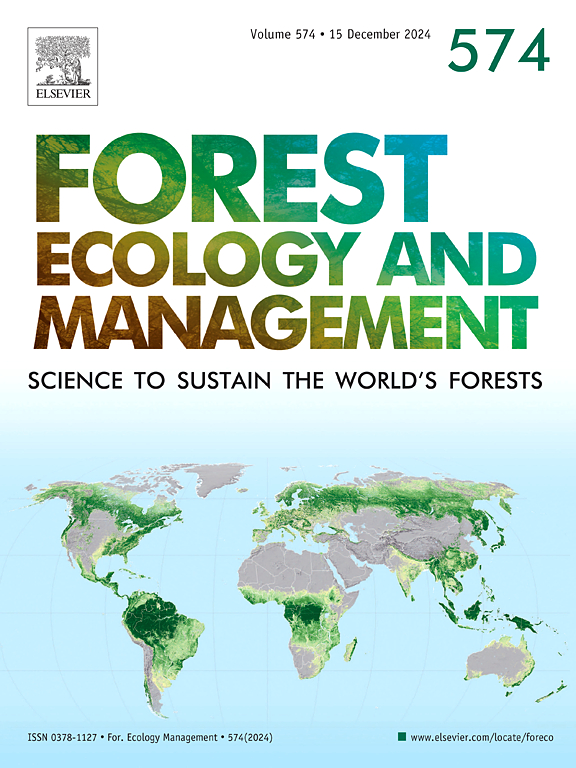Tree size diversity can enhance the drought resilience of Abies alba Mill. in the European mountain forests
IF 3.7
2区 农林科学
Q1 FORESTRY
引用次数: 0
Abstract
The increasing frequency and severity of extreme events, such as drought, are expected to disturb forest ecosystems worldwide. Stand structure, including tree size diversity, may play a crucial role in how forests respond to these changes. This study examines the effect of tree size diversity on the drought resilience of silver fir (Abies alba Mill.) using data from 138 circular plots in even- and uneven-aged mountain stands across Germany, Italy, and Poland. Increment cores from nearly 600 trees were evaluated to calculate complementary resilience indices. Generalized linear mixed-effect models were fitted to assess how tree size diversity affects individual tree growth response to drought stress under varying environmental conditions, mediated by admixture of broadleaf species, stand density, and individual tree size. We found that tree size diversity improves the growth response of silver fir to drought stress, expressed by higher resistance and stress-driven deviation (SDD) indices, in more water-limited sites. However, this benefit diminishes or becomes slightly negative with increasing climate humidity. Similarly, smaller trees demonstrated higher resistance and SDD, although these effects also weakened with more favorable water conditions. The admixture of broadleaf species and stand density did not mediate the impact of tree size diversity on growth resilience. Our results are in line with the stress-gradient hypothesis. Ecophysiological adaptations to prevailing conditions can lead to different competition regimes (symmetric and asymmetric), causing variations in the impact of stand structure on drought resilience. Since tree size diversity is crucial in water-limited environments, it can be considered a strategic forest management tool for adapting silver fir-dominated forests to anticipated global changes.
树型多样性可以提高冷杉的抗旱能力。在欧洲的山林中
干旱等极端事件日益频繁和严重,预计将扰乱全球森林生态系统。林分结构,包括树的大小多样性,可能在森林如何应对这些变化中发挥关键作用。本研究利用来自德国、意大利和波兰的平均和不均匀年龄山地林分的138个圆形样地的数据,考察了树木大小多样性对银杉(Abies alba Mill.)抗旱能力的影响。对近600棵树的增量岩心进行了评估,计算了互补恢复指数。本文拟合广义线性混合效应模型,以评估不同环境条件下,阔叶树种、林分密度和单株树高的混合如何影响单株树生长对干旱胁迫的响应。研究发现,在水分限制较多的地区,树型多样性提高了银杉对干旱胁迫的生长响应,表现为更高的抗旱性和应力驱动偏差(SDD)指数。然而,这种好处随着气候湿度的增加而减少或变得稍微消极。同样,较小的树木表现出更高的抗性和SDD,尽管这些影响在更有利的水分条件下也会减弱。阔叶树种和林分密度的混合并没有调节树木大小多样性对生长恢复力的影响。我们的结果符合应力梯度假设。对普遍条件的生态生理适应可导致不同的竞争机制(对称和不对称),从而导致林分结构对抗旱能力的影响发生变化。由于树木大小的多样性在水有限的环境中是至关重要的,它可以被视为使银冷杉为主的森林适应预期的全球变化的战略森林管理工具。
本文章由计算机程序翻译,如有差异,请以英文原文为准。
求助全文
约1分钟内获得全文
求助全文
来源期刊

Forest Ecology and Management
农林科学-林学
CiteScore
7.50
自引率
10.80%
发文量
665
审稿时长
39 days
期刊介绍:
Forest Ecology and Management publishes scientific articles linking forest ecology with forest management, focusing on the application of biological, ecological and social knowledge to the management and conservation of plantations and natural forests. The scope of the journal includes all forest ecosystems of the world.
A peer-review process ensures the quality and international interest of the manuscripts accepted for publication. The journal encourages communication between scientists in disparate fields who share a common interest in ecology and forest management, bridging the gap between research workers and forest managers.
We encourage submission of papers that will have the strongest interest and value to the Journal''s international readership. Some key features of papers with strong interest include:
1. Clear connections between the ecology and management of forests;
2. Novel ideas or approaches to important challenges in forest ecology and management;
3. Studies that address a population of interest beyond the scale of single research sites, Three key points in the design of forest experiments, Forest Ecology and Management 255 (2008) 2022-2023);
4. Review Articles on timely, important topics. Authors are welcome to contact one of the editors to discuss the suitability of a potential review manuscript.
The Journal encourages proposals for special issues examining important areas of forest ecology and management. Potential guest editors should contact any of the Editors to begin discussions about topics, potential papers, and other details.
 求助内容:
求助内容: 应助结果提醒方式:
应助结果提醒方式:


